High-powered group assembled by Linc Kroeger of Pillar Technologies
A year ago if someone had said Greene County could become another Silicon Valley, he or she would have been scoffed at. A year ago very few Greene County residents had heard of Pillar Technologies or Linc Kroeger, and people weren’t thinking of building a career academy at the same time as a new high school.
Much has changed in the county during the past year, and about 150 area residents and members of the media heard Saturday evening that even bigger changes may be in store.
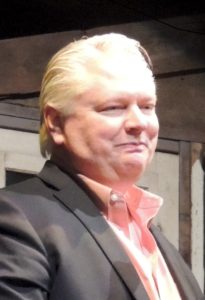
Linc Kroeger of Pillar Technologies (now owned by Accenture) hosted high-powered guests from the Silicon Valley in Jefferson, showing them the town and the former Odd Fellows Hall, which in early June will open as Pillar’s newest Forge. Kroeger recruited them to participate in his Revive, Rebuild, Restore initiative, which seeks to rebuild rural communities by making them home to innovative technology companies. R3, as Kroeger calls it, would enable young people drawn to high tech jobs to stay in the rural areas they’re familiar with rather than relocating in California or the East.
Due in large part to Chris Deal, a 2003 Jefferson-Scranton graduate and now a mechanical engineer, Kroeger is locating Pillar’s first rural Forge in Jefferson. Kroeger thinks of it as a model that can be replicated in other rural areas.
People like Kevin Scott, chief technology officer of Microsoft, Allen Blue, co-founder of Linkedin, Mitch Matthews, author of Dream, Think, Do, and Congressman Ro Khanna of California’s 17th Congressional district (the Silicon Valley) are partners with Kroeger in proving he’s correct.
Each of the partners spoke briefly at an invitation-only event at History Boy Theater. Guests included Jefferson city council members and Greene County supervisors, representatives from the county’s larger employers, those who were instrumental in the school bond referendum campaign earlier this year, Jefferson Matters: Main Street board members, representatives of Des Moines Area Community College and Iowa Central Community College, and members of the local, regional, and national media.
During opening comments Kroeger said what he’s doing “is for Jefferson, is for rural Iowa, and is for rural America…. There is no nobody focused on rural America. I’m involved in so many urban development plans, which are so important and we need to do, but rural America’s been left for dead.”
Kroeger said 78 percent of Iowans who finish a four-year college degree in STEM (science, technology, engineering, math) leave the state. He wants to change that.
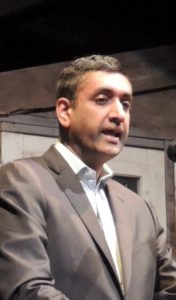
Ro Khanna (D-Calif), represents Silicon Valley in the House of Representatives. He explained that six months ago Kroeger reached out to him, and finally went to California to see him. Khanna emailed other people Kroeger had pitched on R3. “They were so blown away by his sincerity, by Jefferson, and what we can do to bring our country together, to create jobs, to show that the Digital Revolution is one that every community can and should participate in. I’m so proud of the people who have come here… as patriots, to do something that is good for our nation.
Khanna said the 180,000 to 200,000 tech jobs that are outsourced to other countries can be done in communities across the country. He said AAI, Power Lift and Scranton Manufacturing demonstrate there is innovation in the county, and the next step is to provide young people with jobs. He said building links with rural towns will make the country stronger in the 21st century.
Chris Deal spoke next and thanked Kroeger for allowing Jefferson to be part of his vision. He noted that the three companies Khanna mentioned are homegrown entrepreneurial companies that demonstrate a Midwest work ethic.
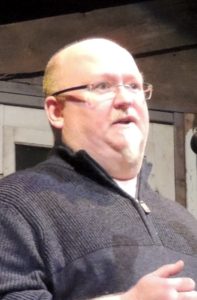
Kevin Scott of Microsoft said he was “incredibly inspired” when he heard of Kroeger’s R3 and his rural Forge. Scott grew up in a small town in Virginia, he said, and had to leave Virginia to begin his career as a computer programmer. “That’s the reason I’m so excited and so hopeful about this… I believe this work can give young people in rural parts of the country, in Iowa, an opportunity to stay where they want to be… to have opportunities for really great tech jobs, to build lives for themselves, and to build an economic foundation for themselves and for the community.”
Scott said it’s crucially important to spread the tech industry across the entire country rather than concentrations of technology in only a few places.
He said his family foundation is contributing to Gov Kim Reynolds’ Future Ready Iowa initiative to help get R3 off the ground. He’s also writing a book to draw attention to the opportunities technology creates and the ability to have good jobs in places like Jefferson. He said the Forge in Jefferson “will look just like any other high tech company sitting in Silicon Valley.”
He said that with video meetings and such, it doesn’t matter much where people are sitting as they work. “I really hope this is not just a success for Jefferson, but that it’s a role model that inspires people across the country to duplicate similar sorts of programs,” he said.
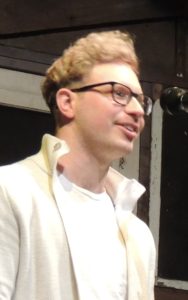
Chase Wilson is director of admissions at the App Academy in San Francisco and New York. The academy is a “coding bootcamp” that teaches computer coding in 12 weeks. Graduates can land jobs starting at $105,000 annually and no tuition is due until a job is secured. The academy has launched an online academy and plans to give a full ride scholarship for the academy to someone from Iowa.
Kroeger introduced A.J. Wahling, who will lead the training program at the Jefferson Forge. Linsey Kitt, Greene County class of 2019, was with Wahling.
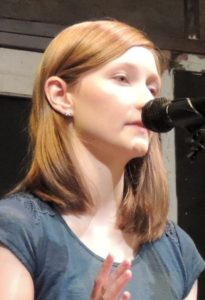
Kitt told of taking a middle school exploratory class in coding and enjoying it, but then losing interest when she couldn’t access more information after the class. She talked about Greene County geometry and technology teacher Jeff Whylie, who started with the district for the 2017-18 school year. She rediscovered her interest in computer coding in one of Whylie’s classes.
She said Pillar Technologies will bring opportunities that most students in rural areas don’t have.
Wahling plans to move to Jefferson. He said he’ll train students so they grow in their ability to write software and deliver high quality software projects. His job will also include recruiting and retaining people and helping them grow in their careers. His third goal is to bring “Triple A” projects – projects that deliver value and are impressive to the world – to rural Iowa. He said the Jefferson Forge will do a project for the San Francisco 49ers at the outset.
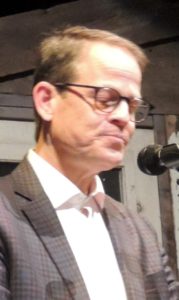
Tim Ritchie, president and CEOI of the Tech Museum of Innovation, said “talent is abundant everywhere. It’s just waiting for an opportunity to burst into a white hot flame.” The Tech Museum of Innovation is a K-12 partner in R3 and will bring its Design Challenge Learning curriculum to the table. The company trains teachers to bring Design Challenge Learning into their classrooms. They’ll do two large in-service trainings for all the teachers in the spring and again next fall. “This is our first serious partnership outside Silicon Valley,” Ritchie said.
“If this works, it can go throughout the country. I think the kind of civic leadership you have here is really quite unusual, that you’ve brought us all together…. Communities change because of overlapping civil institutions. A lot of times rural communities can’t have that overlapping leadership that creates the conditions for change. You have it here and you should be happy for it and we’re really happy to be part of it.”
Design learning will be done at all grade levels.
Greene County school superintendent Tim Christensen said the district is working to build the curriculum. All middle school students are now taking computer classes. He said he’s eager for the connections and contacts Pillar/Accenture is bringing. He’s also excited about the opportunity for new jobs that will increase population and school enrollment.
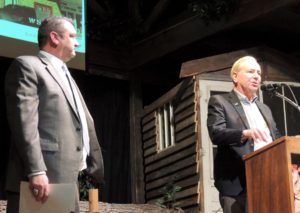
Next to speak were Dan Kinney and Rob Denson, presidents of Iowa Central Community College and Des Moines Area Community College, respectively. Iowa Central will furnish/equip, staff and operate the career academy. In most cases, high school students in one community college region do not attend classes in another region. However, Iowa Central and DMACC have agreed to work as partners in training students for tech jobs.
Kinney thanked Kevin Scott of Microsoft for the donation his family foundation made to Iowa Central for scholarships for Greene County students studying technology, and Brad Garlinghouse, CEO of the cryptocurrency company Ripple for helping fund the computer lab at the career academy. (Garlinghouse was present bud did not speak on stage.)
Denson said DMACC will roll out a computer science course in Java that will be available to Forge-bound high school students in January. Denson called Saturday night “The start of a revolution,” and said he looks forward to similar partnerships happening across Iowa.
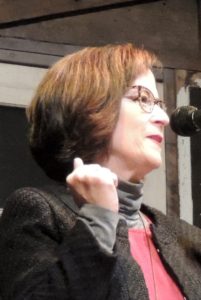
Iowa Workforce Development director Beth Townsend spoke in the absence of Gov Reynolds. She said Future Ready Iowa is the overall strategic plan for developing Iowa’s workforce. “What we’re seeing here in Jefferson is the poster child for what we want to do all across Iowa,” Townsend said.
She said Iowa has three things that aren’t combined anywhere in the country as well as in Iowa. She said Iowans collaborate across all levels of education and industry; Iowans have a strong commitment to finding local solutions to local issues; and strong leadership in communities, government, business and industry, and education.
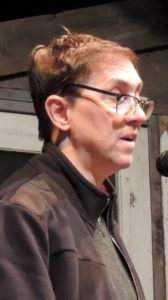
Greg Huber, director of the Bio Hub, spoke about his work. Bio Hub is a science research institute formed by Priscilla Chan and Mark Zuckerberg with a goal of curing or managing all human disease within 100 years. University of California-Berkeley, University of California- San Francisco, and Stanford are in the consortium. Huber is a bio physicist; he says biophysics and computer science are closely aligned. The work they’re doing requires brilliant people. “We believe we want to have the most diverse workforce possible, and that brilliant people are everywhere. With Linc’s help, we’re going to find brilliant people here in Iowa and we’re going to do externships and internships and see how that works out,” Huber said.
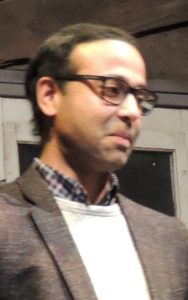
Madhu Chamarty is CEO of Beyond HQ. His company helps tech start-ups and companies expand their workforce outside the Silicon Valley. Beyond HQ recommends locations and manages expansion projects. The company looks for places that have strong local talent, a supportive local community, and a strong list of partners.
Kroeger and dean MD Isely of DMACC met with Du two months ago and “educated” him “about all the things that are happening in Jefferson, about R3 and Future Ready Iowa… They talked about work ethic and resiliency and collaboration, and these are the same characteristics required for successful start-ups,” he said.
He plans to do all he can to showcase Jefferson and other communities as options for growth to start-ups in Silicon Valley.
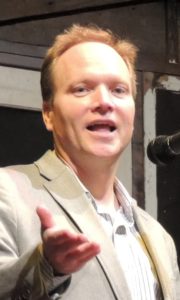
Next to speak was venture capitalist Greg Sands, CEO of Costanoa Ventures. Costanoa invests in early stage software companies selling to businesses. According to Sands, “it’s the work of the country to expand digital job opportunities.” He wants to create companies in Iowa for Iowans. He has pledged to invest $50,000 in the winner of “Shark Tank” competition to be held next June soon after the opening of the Jefferson Forge.
Zack Mannheimer told of the creative placemaking he has done for Greene County Development Corporation, and said “the ideas happening in Jefferson are bold beyond belief,” and that he has seen more investment in Greene County than in any other county he’s worked with.
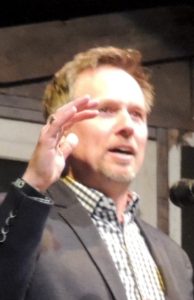
Mitch Matthews is author of Dream, Think, Do. He originated Big Dream Gatherings, which have been held all over the country. He will work with Kroeger to have a Big Dream Gathering in Jefferson.
Allen Blue, co-founder of Linkedin, said he’s learned the importance of taking initiative, and that the Pillar project shows leadership, innovation and collaboration. He said Jefferson can be “a lighthouse for attacking skills problems across the U.S.” He said he will send people to Jefferson to see how skills gap challenges have been solved.
Kroeger said that new owner Accenture three weeks ago made his position fulltime working on the R3 initiative.
Demolition on the interior of the Odd Fellows building west of Sierra Community Theatre is under way. The $1.7 million renovation, which is being carried out by Chris Deal, doing business as East State Street Properties LLC, will be completed in late spring.
